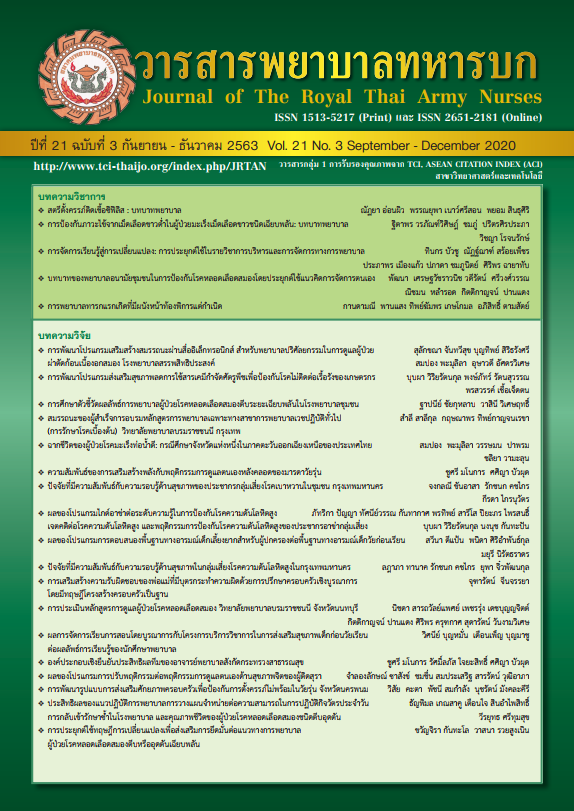Self-Perceived Palliative Care Competencies of Nurse Working in A University Hospital within less Than Two Years of Receiving Bachelor’s Degrees
Keywords:
Competencies in Palliative Care of Professional Nurses, Palliative Care, Terminally ill PatientAbstract
The purpose of this descriptive study was to study the perception of palliative care competency among professional nurses who started working in a University Hospital in less than 2 years after completing a bachelor’s degree. One hundred forty-five nurses met the criteria as they had the experiences of caring at least one terminally ill patient. Data collection was conducted from August to November 2018 using the questionnaire consisting of; 1) Personal data, and 2) The palliative care nursing self-competence scale. The Content Validity Index (CVI) was 0.95; Cronbach’s alpha value was 0.987. The data were analyzed using descriptive statistics and independent t-test. The results of this study indicated that professional nurses starting to work in less than 2 years after completing the bachelor’s degree had fewer experiences in palliative care. Most of them had not been trained or prepared on this topic. As a result, they had fear and stress when taking care of terminally ill patients. Therefore, we should encourage the preparation of newly graduated nurses by providing knowledge or training in palliative care to reduce fear and stress when caring for terminally ill patients. Besides, palliative care training can help improve their self-confidence to take care of palliative patients.
Downloads
References
Paisansuthideth U. Nurse’s Role in End of Life Care: Best Practice for Cancer care; 2010. (in Thai).
Nursing Division Ministry of Public Health. Palliative Care system. Nonthaburi: Nursing Division Ministry of Public Health; 2014. (in Thai).
Ministry of Public Health. Service Plan 2561- 2565. Nonthaburi: Ministry of Public Health; 2014. (in Thai).
Mahaweranon I. Documents for presentation at the conference on palliative care in Taiwan; 2017. (in Thai).
Keawtong W, Rawiworakul T, Kalampakorn S, Kerdmongkol P. Competencies Of Palliative Care Among Community Nurses In Primary Care Units. Journal of The Royal Thai Army Nurses, 2017; 18 (suppl.1): 74-83. (in Thai)
Artsanthia J. Palliative Carein community with the concept of Buddhism. Journal of The Royal Thai Army Nurses, 2014; 14(2): 9-16. (in Thai)
Prompahakul, C. Factors relating to nurses’ caring behavior for dying patient in Southern Thailand. Unpublished master’ s thesis, Prince of Songkla University, Songkla, Thailand; 2011. (in Thai).
Akarathanarak T. Relationship between Preparedness and Caring Behavior for Patients at the End of Life among Novice Nurses. Journal of Public Health Nursing, 2017: 31(1): 160-174. (in Thai)
Dahlin CM, Wittenberg E. Communication in Palliative Care: An Essential Competency for Nurses. Oxford Textbook of Palliative Nursing (3th ed.). New York: Oxford University Press; 2010.
Johnson A, Chang E, O’Brien L. Nursing the dying: A descriptive survey of Australian undergraduate nursing curricula. International Journal of Nursing Practice, 2009; 15(5): 417-425.
Nuekwen P, Hanprasitkam K, Junda T. Nurses’ perception and practice on palliative care. Thai Jounal of Cardio-Thoracic Nursing, 2016; 27(1): 128-141. (in Thai).
Hanprasitkam K, Patoomwan A, Churaitatsanee S, Paisansuthideth U. The Effect of an End-of-Life Care Education Program on Nurses’Knowledge, Attitude, and Practice in Caring for End-of-Life Patients. Ramathibodi Nursing Journal, 2011; 17(1): 126-140. (in Thai).
Nupinit V, Nilmanat K, Mutchim Y. Selective Factors Related to Intensive Care Units’ Registered Nurses’ Competency in Caring for Terminally Ill Patients. Thai Journal of Nursing Council, 2017; 32(4): 94-106. (in Thai).
Chaipetch O, Nilmanat K, Kong-in W. ICU Nurses’ Experience in Caring for Patients at The End of Life. Thai Journal of Nursing Council, 2011; 26(1): 41-55. (in Thai).
Artsanthia J. Palliative Carein community with the Buddhism traditions. Journal of The Royal Thai Army Nurses, 2013; 14(2): 9-16. (in Thai).
Pramoj Na Ayutthaya P, Monkong S, Intarasombat P. The Effect of a Supportive Educational End-of-Life Care Program on Knowledge and Perceived Self-Efficacy of Professional Nurses. Ramathibodi Nursing Journal, 2011; 17(1): 141-156. (in Thai).
Maeroh N, Kongsuwan W, Yodchai K. Barriers in Providing Palliative Care in Intensive Care Units: Nurses’ Experiences. Songklanagarind Journal of Nursing, 2017; 37(3): 74-82. (in Thai).
Pattrapakdikul U, Sunthornwipat M. Job Stress in Caring for Terminally Iii Patients among Nurses in Songklanagarind Hospital. Songklanagarind Journal of Nursing, 2009; 29(3): 74-27. (in Thai)
Downloads
Published
How to Cite
Issue
Section
License
บทความหรือข้อคิดเห็นใดใดที่ปรากฏในวารสารพยาบาลทหารบกเป็นวรรณกรรมของผู้เขียน ซึ่งบรรณาธิการหรือสมาคมพยาบาลทหารบก ไม่จำเป็นต้องเห็นด้วย
บทความที่ได้รับการตีพิมพ์เป็นลิขสิทธิ์ของวารสารพยาบาลทหารบก
The ideas and opinions expressed in the Journal of The Royal Thai Army Nurses are those of the authors and not necessarily those
of the editor or Royal Thai Army Nurses Association.






